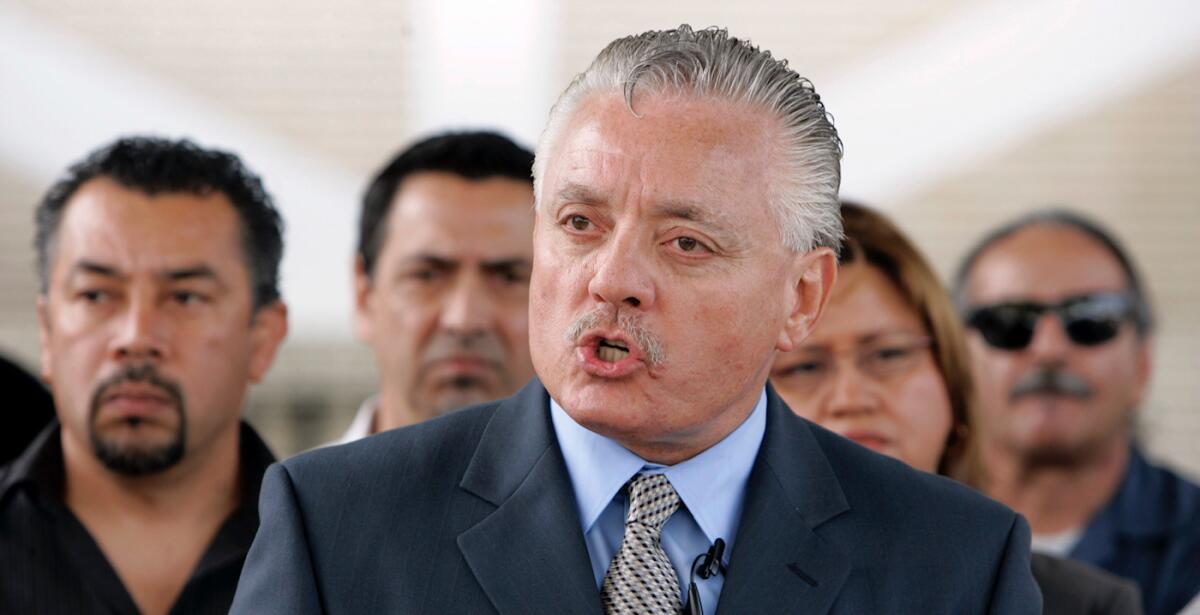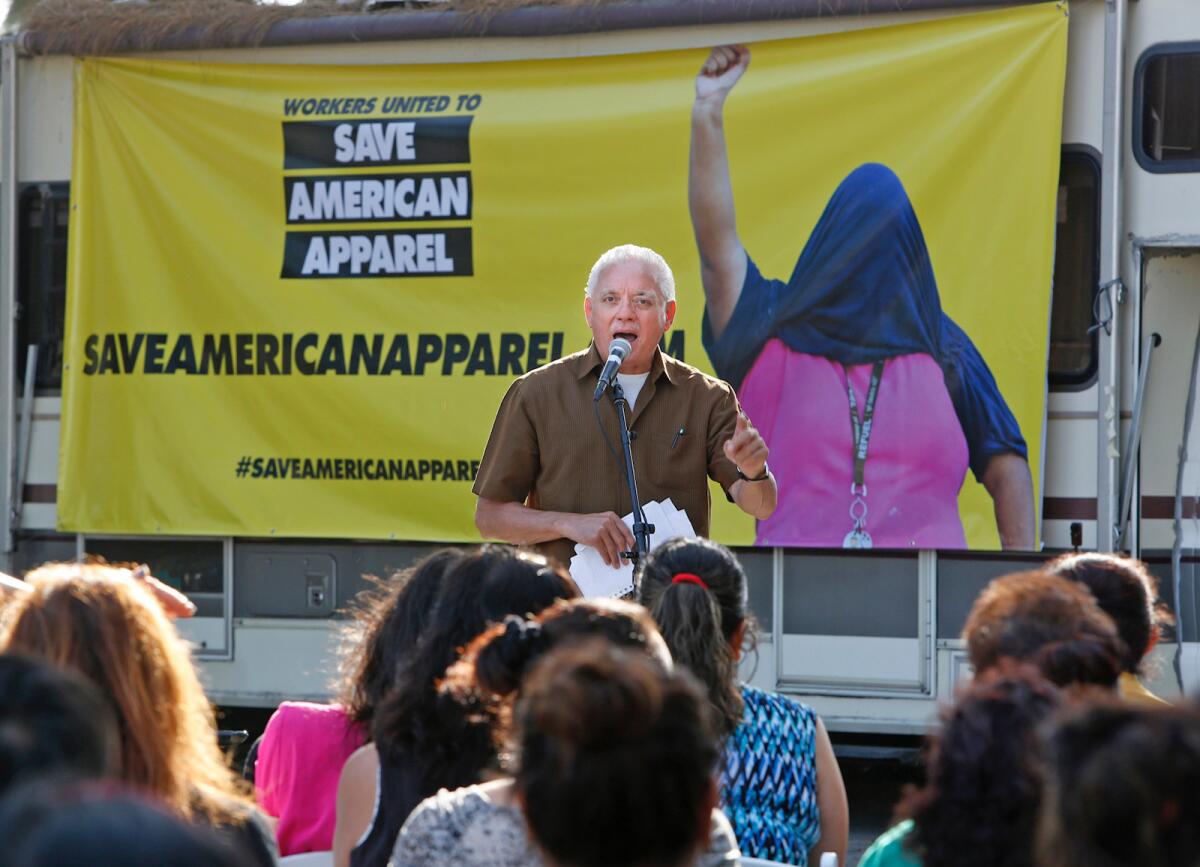Nativo Lopez, a pioneering and polarizing Latino leader in O.C. and L.A., dies at 68

When filmmaker Mylène Moreno decided to find a story in 2003 that would illustrate for a national audience how Orange County had changed from the white, conservative stronghold of her youth into something more complex, she chose Nativo Lopez.
The Santa Ana Unified School Board trustee was facing a recall launched by parents who opposed his support of bilingual education. Backing them were Democrats and Republicans who despised Lopez’s longtime advocacy for Latino immigrants and his constant attacks against those he perceived to be vendidos — sellouts.
Moreno says that the timing for the eventual documentary, “Recalling Orange County,” which aired on PBS in 2006, “was kind of perfect...The fact that he had been elected indicated there had been massive political change in Orange County. Yet all these forces coalesced against him because he was teaching [Latinos] that maybe they have some rights they can assert.”
Lopez died Sunday after a brief battle with cancer. He was 68.
Born Larry Lopez in 1951 in Boyle Heights, Lopez grew up in Norwalk in a family that had lived in the United States for six generations. Organizing began early: In 1970, as an 18-year-old at Excelsior High School, Lopez and his brothers led a walkout of more than 200 Mexican American students to protest what they claimed were racist conditions at school.
He changed his name to Nativo (“native,” in Spanish) and went on to jump-start a Chicano Studies department at Cerritos College and majored in Spanish literature at Cal State Dominguez Hills before finding work as a court interpreter in Los Angeles County. But he found his true calling in Orange County in the early 1980s, a time when the area began its demographic and political transformation.
After working with the American Friends Service Committee, Lopez founded a Santa Ana chapter of Hermandad Mexicana Nacional, a group that focused on immigrants in the country illegally at a time when most Latino activists ignored them. He had already apprenticed for a decade under the group’s legendary leader, Bert Corona.
FROM THE ARCHIVES: Santa Ana Rent Strike: A New Role for Latinos »
Lopez made national news in 1985 when he helped more than 500 Santa Ana families stage a successful rent strike. He honed an aggressive, unapologetic campaign that he replicated for decades: Lopez rallied hundreds to city council meetings, brought protests to the houses of slumlords, and served up juicy quotes to a press who couldn’t get enough of a Latino who dared take on the Orange County political establishment with an army of immigrants here illegally.
No less an icon than Cesar Chavez admitted Lopez was “ahead of the pack on this one.”
Soon, Hermandad received millions of dollars in state and federal grants for citizenship and English-language classes. Lopez doubled down on his O.C. activism, speaking in favor of jailed drywallers who went on strike, against Proposition 187 — the right-leaning ballot measure that would have blocked those in the country illegally from getting a public education, among other services -- and blasting Latino politicians like Santa Ana Mayor Miguel Pulido and Orange County Supervisor Gaddi Vasquez for using their ethnic identity for political gain while ignoring Latino constituents.

Such stridency led to criticism that Lopez used immigrants to flout nonprofit law and further his political causes. The clapbacks reached a dramatic apex in 1996 when Loretta Sanchez defeated longtime Congressman Robert K. Dornan (R-Garden Grove) by fewer than 1,000 votes in the wake of a massive Hermandad voter-registration drive.
Dornan accused Lopez and his volunteers of illegally registering noncitizens to help Sanchez win. The Orange County district attorney’s office, the California secretary of state and Congress pursued investigations, while the local media committed multiple reporters to investigate the allegations.
Lopez remained defiant, even haughty.
“This is the last desperate gasp on the part of the most conservative, extremist elements of the Republican Party to maintain the monopoly of political control that they have heretofore had in Orange County,” he told the Orange County Register in 1997. That year, dozens of activists protested outside The Times’ Orange County bureau for its Lopez coverage. “But they will fail.”
He was proved right; although a House subcommittee found Hermandad had registered voters in error, neither the group nor Lopez ever faced charges.
Lopez was the undisputed champion of immigrant rights.
— Los Angeles City Councilman Gil Cedillo
By then Lopez, who had won a seat on the Santa Ana Unified Board of Trustees, became a first-name persona in Orange County: Nativo. Imposing and verbose, with a propensity for natty suits and slick-backed hair, Lopez became a favorite of English- and Spanish-language radio and television and frequently wrote newspaper columns. Followers praised him as a brave man who took the fight to the belly of the beast; detractors dismissed him as little better than a corrupt race hustler.
Meanwhile, Hermandad faced problems. The Department of Education ordered that it pay back millions of dollars in grants for allegedly misusing them; the Franchise Tax Board suspended its corporation status in 2000 for failing to file state tax returns.
Those issues, along with accusations of cronyism and campaign finance irregularities, led to Lopez’s decisive recall in February 2003. At the next trustee meeting a week later, an overflow crowd that included Mayor Pulido gave a standing ovation to the Lopez-less board.
The firebrand had become a cautionary tale: the Mexican who dared to take on the lords of Orange County, and lost.
He spent the next 15 years organizing almost everywhere but Orange County. Lopez helped to plan the massive 2006 amnesty marches in Los Angeles, and was in McAllen, Texas, earlier this year to protest conditions on the U.S.-Mexico border. He teamed up with then-state Sen. Gil Cedillo (D-Los Angeles), whom he had known since the 1970s, get a bill passed that allowed immigrants here illegally to apply for driver’s licenses. Then-Gov. Arnold Schwarzenegger repealed one version in 2003, but Gov. Jerry Brown signed into law another in 2013.
“Lopez was the undisputed champion of immigrant rights,” Cedillo, now a Los Angeles councilman, wrote in a Facebook post Sunday night. “The entirety of his adult life was focused around one noble cause: to ensure that immigrant workers and their families, with or without documents, were treated with the dignity and respect they deserved.”
But controversy chased Lopez even in L.A. He and his family began rival Hermandad Mexicanas after splitting with the original, which is still run by Corona’s widow. In 2009, the district attorney’s office charged Lopez with nine felony counts of illegally voting in Los Angeles while continuing to live in Santa Ana. He eventually pleaded guilty to one charge of voter registration fraud, and was sentenced to three years’ probation and 400 hours of community service.
Lopez is survived by his daughters Taina Reyes, Xel’ha Lopez and Hayme Lopez; and five grandchildren. Services are pending.
Charming in person to friends and enemies alike, Lopez took all critiques as welts of honor.
“They said [bad things] about Jesus Christ, right?” Lopez told The Times in a 1990 interview. “They said that about Cesar Chavez. They said that about many people that are maybe headstrong about pursuing rights.”
Twitter: @GustavoArellano
More to Read
Sign up for Essential California
The most important California stories and recommendations in your inbox every morning.
You may occasionally receive promotional content from the Los Angeles Times.











